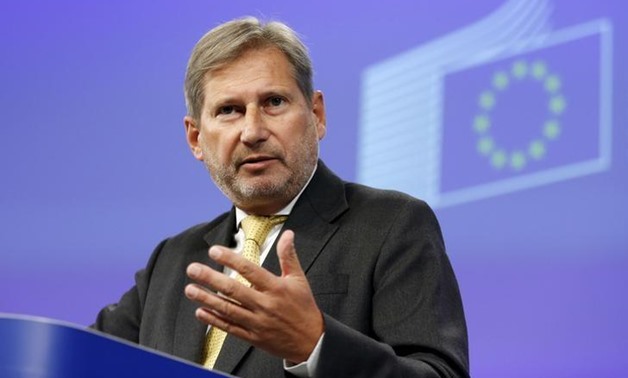
European Neighbourhood Policy and Enlargement Negotiations Commissioner Johannes Hahn gestures as he addresses a news conference at the EU Commission headquarters in Brussels, Belgium, September 17, 2015. REUTERS/Francois Lenoir
CAIRO – 29 October 2017: The European Commissioner for European Neighbourhood Policy and Enlargement Negotiations Johannes Hahn told Italy’s AKI News Agency that the European Union (EU) will continue supporting the economic reform program executed by the Egyptian government.
Before his visit to Cairo from Sunday through Tuesday, Hahn said Egypt’s development plans seem quite ambitious. He will discuss with Egyptian officials the mechanisms by which to achieve the key goals of the EU-Egypt partnership.
Both parties will also sign agreements to fund a number of projects by the EU who are “committed to the contribution to Egypt’s integrated and sustainable development program, and creating jobs for Egyptians.”
Hahn is scheduled to meet with President Abdel Fatah al-Sisi, Prime Minister Sherif Ismail, Minister of Investment and International Cooperation Sahar Nasr, Minister of Foreign Affairs Sameh Shoukry, and business people.
The current economic cooperation program between the EU and Egypt is scheduled to start in 2017 and end by 2020. On October 19, Nasr met with the EU delegation to Egypt headed by Ivan Surkos to discuss European subsidies to Mediterranean countries and cooperation priorities.
In July, Egypt and the European Commission signed a Partnership on Research and Innovation in the Mediterranean Area (PRIMA) agreement in Cairo. PRIMA aims to reach solutions for more sustainable management of water and agro-food systems.
The main objective of the ten-year initiative (2018 – 2028), which is partially funded by EU's research and innovation program Horizon 2020, is to devise new research and innovation approaches to improve water availability and sustainable agriculture production in a region heavily distressed by climate change, urbanization and population growth.
The partnership currently consists of 19 participating countries: Algeria, Croatia, Cyprus, Egypt, France, Germany, Greece, Israel, Italy, Jordan, Lebanon, Luxembourg, Malta, Morocco, Portugal, Slovenia, Spain, Tunisia and Turkey.


Comments
Leave a Comment